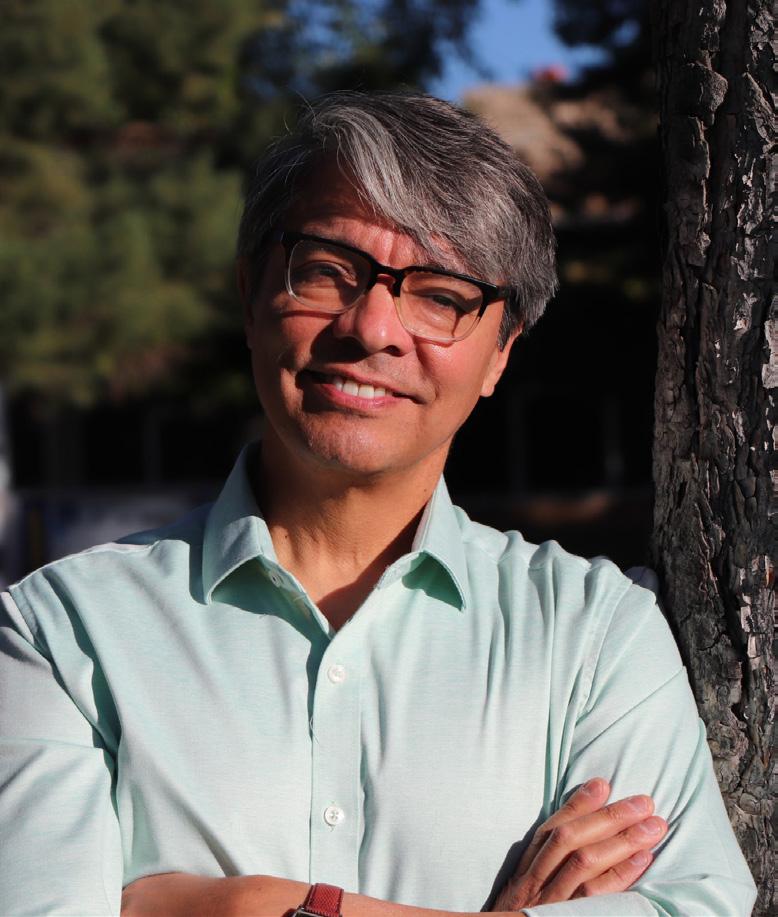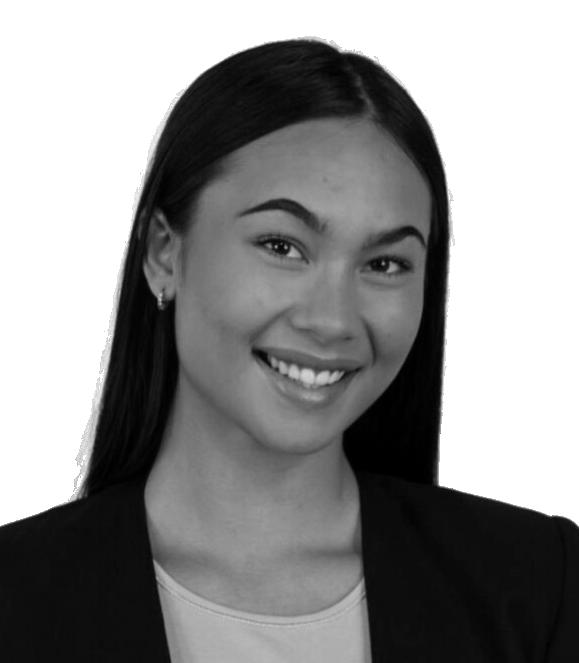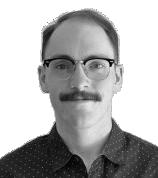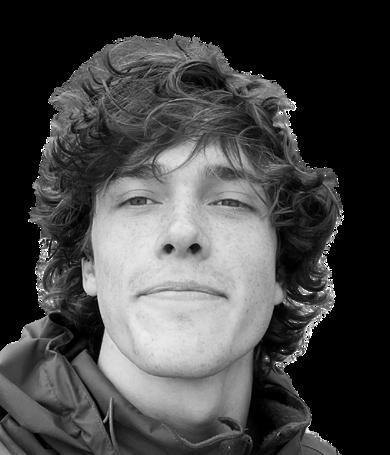PERSISTING ON THEIR PATH TO GRADUATION
At the start of the semester, we met with students to understand why they choose to stay at Fort Lewis College and their motivation to continue pursuing their degrees. Their insights were truly inspiring, reinforcing our commitment to retention efforts and strengthening our belief that our goals are achievable.
Carmen Hall, Economics
Carmen Hall joined Fort Lewis College (FLC) as a non-traditional student in Spring 2024 to pursue her entrepreneurial ambitions. She quickly fell in love with the remote campus, the faculty, and the diverse range of opportunities the school offers.
Hall was especially inspired by FLC’s efforts in reconciliation and the strategic planning process currently underway.
“I think [the strategic plan] has the ability to create social change and cultural waves throughout the nation and especially in higher education, which I think is so important and also very attractive to young people,” she said.
Hall also credits her positive experience at FLC to the supportive faculty, she said, “Liz Cartier, Michael Valdez, Steve Elias, and definitely Nathaniel Peach. Basically, every everyone in the business school is so supportive of me and they’re all in on my startup ventures.”
Her involvement in student government connected her with another mentor, Ruth Alminas. “She’s just so intelligent and dedicated to social justice work. She inspires me the most,” Hall shared. “Especially because with business, I feel like that’s my people, and venturing into government is something new.”
While Hall’s dreams of having her own business in the fashion industry may lead her to transfer, for now she is excited about the opportunities she sees to expand campus offerings for her peers.
“I want to launch a fashion club here and bring the eCornell design course to our campus. And I’m inspired to launch a contemporary housing club to engage more of the community and stakeholders around what affordable housing actually looks like,” she explained.
Devyn Valandra, Entrepreneurship & Small Business
Ever since the idea for his coffee company, Wakȟályapí Coffee, began percolating back in high school, Devyn Valandra has continued to grow his vision throughout his five years at FLC. He won the 8th annual Hawk Tank Business Plan Competition and his business plan took home a win at the 2023 National American Indigenous Business Leaders (AIBL) Leadership Conference. Despite all his success, Valandra acknowledges that it can be hard to persist in college.
“I think just being determined and dedicated to all the years and work I’ve done here has definitely kept me here. I‘ve had a lot of struggle, too. I’ve had to learn to change my way of thinking about my experiences and environment and what I’m going through. And that’s how I’m able to continue persevering,” he explained.
Valandra says that in addition to his inner strength, opportunities for connection such as the smaller class sizes, being able to get one-on-one help from professors, and the campus culture keep him and other students going.
“As the president of AIBL I’m working with other RSOs. I’m meeting them, networking with them, seeing them often. It definitely has allowed me to connect with people on a deeper level, create friendships and just relationships with classmates in general. The culture of this place definitely brings us together,” he said.
Professors have also provided Valandra with the support to persevere. He points to professors Michael Valdez and Carma Claw as having an impact.
“They have helped me a lot, not only with the small business side but also learning all these skills and applying them to my life, my Native American and Indigenous Studies minor, and how to apply that to business and the world of ethics. They’re really amazing professors,” he said.
Daniella Masha, Engineering
Arriving in the United States for the first time and beginning her first semester of college was a major adjustment for Daniella Masha. She initially wasn’t sure if she was in the right place. She explained, “I actually felt I didn’t belong, because Durango, it’s not a very diverse town, so I kind of felt like an imposter. But then, just being here and being part of the community. Durango has people who are very welcoming and impressing. Students here are very friendly and welcoming, so it kind of felt like, ‘okay, I know I’m not from here, but I can fit in.’”
In addition to the offerings she found for international students like academic supports, merit scholarships, and sponsorship programs, Masha found that faculty were also incredibly helpful.
“In the engineering department one of the professors I’ve been able to work one-on-one with is Matthew Klema. He’s really been supportive in terms of bringing opportunities to you, involving you. I met him in Engineering 104 and he considered me for his research projects. He always inquires about us, how we’re doing in class, ready to help hands-on. He’s one person who you can go talk. I can talk to him if I feel like I need some advice.”
Masha even found support when she opened an account at a local bank, “I went to register my bank details in the bank, and the bank representative, I told him about my dream, coming here, doing engineering. So every time I end up in the bank, he’s always encouraging me. He’s telling me if you ever feel like you’re going to give up on this dream of yours, come to me. I’ll talk to you. I’ll give you the encouragement.”
“People just want to be a part of your dream and they feel inspired and motivated that you’re actually doing it without giving up,” said Masha.
Chris Melvin, Music Education
Chris Melvin always knew that he wanted to become a singer. During COVID, his high school choir teacher recognized how reliable Melvin was. He quickly he learned his music and always showed up to the Zoom meetings, which provided an opportunity for his choir teacher to have more in depth conversations about his future in music.
“He started asking me a bunch of questions, and we managed to get on the conversation of music education and how important it was. And I used music as a way to escape my awful home life. And at that point, it kind of just clicked in my head, I could do that for other students, and I could be an example for other students as a queer person who’s successfully doing what he wants to do,“ Melvin said.
Melvin was drawn to FLC because of the Music Education program, but it would be a conversation with Al Wolfe that would help him find his community at FLC. He met Wolfe through the admissions process and during one of their conversations Melvin shared that he was queer and Wolfe introduced him to the Gender & Sexuality Resource Center (the G) and all the LGBTQ+ resources offered at FLC. Wolfe and the G would play a pivotal part in his persisting in college.
“Most of all, it was Al. Quite honestly, without them, I don’t know what I would do,” he said when describing how Wolfe supported him and offered guidance during a difficult time.
Melvin also became involved in the Sexuality and Gender Alliance club (SAGA) where as Vice President he’s been able to help expand offerings that create a more welcoming community and that he feels help retain other students.
“A lot of them have stayed because of the queer community here and the way that it’s structured and built because it’s so rare to find a really good and welcoming community especially on smaller campuses where it can become really cliquey really quickly,” he said. “The G is for queer people and allies. So long as you’re supportive of the queer
community you’re free to come in. And we have like a bunch of student TAs and professors do office hours there as well so it’s really great.”
Ruben Shroulote, Exercise Physiology
For Ruben Shroulote, family played an important role in persisting at FLC. Shroulote first came to FLC to follow in his sister’s footsteps, “She convinced me to go. She was one of the very first to graduate here for my family. It was already her junior year, so I only had two semesters with her. She graduated last year with her Bachelor’s in criminology.”
While coming to FLC may have been following in her footsteps he chose a different major in the hopes of learning how to heal his own body. He said, “I had a lot of injuries growing up, so I wanted to just fix myself on my own and to even help others. Like, ‘Oh, I can tape you up. I can help you get better.’”
When his mother passed the Friday before finals week in his first year at FLC, Shroulote wasn’t sure he would be able to continue. He found support in his cousin who worked at the FLC Native American Center (NAC), she emailed all his professors to let them know what had happened and connected him with resources. He went home and wasn’t sure what to do next, then a talk with his dad helped him see the way forward. “Towards the middle of summer, my dad asked are you going back to school? We had a real long talk, and he was like, if you’re having trouble doing it for yourself, your mom is watching over you, do it for her.”
Having a community like the NAC and the friends Shroulote has made helps him persist. After speaking with former high school cross-country teammates, they’ve been inspired to find their community here and to attend FLC.
Mara Melter, Psychology
After graduating high school, Mara Melter opted to wait to attend college. Her choice allowed her to prioritize self-discovery in a way that she says made it easier to persist on her path to obtaining a degree.
“I had done a lot of self-exploration before coming to college, and I think that helped instill in me that, like, I need to do this. Like, I’m ready to get a college degree,” she said. “I was very sound in my decision to go to college and saying I really want to pursue psychology, feeling really confident there.”
She also pointed to the Native American Tuition Waiver as playing a role in her persistence, “I’m really grateful for the tuition waiver. That is a huge reason why I’m also, I think, still stayed in school. I think if I were to have the financial burden of regular tuition, I don’t know if I would have stayed.” While at FLC, Melter has experienced some loneliness being far from home, especially when she felt pulled to be home to help with family issues.
“I just didn’t have a lot of people here. That was a huge part that influenced me considering going home and I actually still struggle socially here. I don’t know if it’s just the age gap or kind of where my social struggles land here at Fort Lewis, but it was really lonely,” she said.
While Melter was able to build relationships and find connections through the Wellness Peer Advisory Council (WellPAC), she sees opportunities for the college to provide more occasions for students to engage with one another in an academic way.
“One thing that would have helped me a lot is more communication in classes. I thought classes would be a good opportunity to make connections in your field, talk to other psych students, or talk to other students in that class you’re in, and I think that would have helped a lot in feeling good about staying at Fort Lewis,” she said.
Justin Coen, Business Economics
Justin Coen, a former Marine, chose to attend college after serving three years in the military. Leveraging his GI Bill to pursue a degree, he earned over 100 credits at San Juan College before transferring to FLC to complete his degree in Business Economics.
While adjusting to civilian and academic life, Coen found FLC’s faculty, especially Stephanie Owings, pivotal in his decision to stay.
“The professors, especially Dr. Owings, made me realize that Business Economics was not only more analytical but also more applicable to my future goals,” Justin explained.
Although he had the option to complete courses online, Coen valued the in-person learning experience, which allowed him to engage more deeply with faculty and his peers.
“I could have done it online, but I decided not to. Being in class made me actually stop and pay attention,” he said, highlighting how the interaction with professors in person challenged him to think more critically.
Coen, who commutes daily from Aztec, New Mexico, found his connection to FLC grew deeper as he engaged more
with the community. While he considered transferring due, the support he received from faculty kept him committed to his education.
“I thought about leaving at one point,” he admitted, “but the faculty here are incredible. They’ve pushed me to be a better student.”
Brenna Coffey, Exercise Physiology
When Brenna Coffey considered leaving FLC and transferring to another school, she says it was the welcoming community and sports opportunities that FLC offers that helped her recognize that she wanted to stay. The perks of being able to work at Purgatory and get a free ski pass, the relationships she built as a peer educator, and participating and coaching club volleyball proved too big to give up.
“I created a lot of connections and I got recruited as a peer educator so that was nice and it kind of made me stay here. I was struggling with a little bit of like, I am kind of far from my family or, you know, my brother’s moving really far away, so I wanted to leave to be closer to him, but I ended up staying because there was too much keeping me here with volleyball and like the peer educator stuff,” she said.
After taking part in JumpStart at the start of her first year at FLC, Coffey was recruited to become a peer educator. She described the peer educator team, “We’re all like friends in a way. We all like know each other. Like we know things about each other. That creates more of a friendship and like a family versus like just, oh yeah, that’s my coworker. Like, no, like that’s my friend, you know?”
Coffey also found connections with professors like Jeb Davis who she said shared many things in common. He even calls her by the nickname “Coffey.”
“He was a really good professor. Always kept me engaged and like talked to me. He’d see me, and say ‘Hey Coffey!’ every single time. ‘Hey, Ms. Coffey!’ every single time he’d see me in the hallway, like make sure to go out of his way to say hi to me,” she said.
Coffey attributes the friendly campus atmosphere and Durango community as contributing to her and her peers staying in school. She said, “You see your professor or teacher in the grocery store. In other places like you walk the other way versus here it’s, ‘oh, hey, how are you doing? Oh, you’re making dinner. Oh, that’s so nice.’ There’s a very like comfortable feeling in Durango. Everyone just knows everyone.”
Desiree Pineda, Sociology
The first year for Desiree Pineda felt like a daunting challenge. She said, “There were definitely times where it felt overwhelming and it felt like something I didn’t know that I could continue.”
Then Pineda participated in Maymester, where she said instructors Ayla Moore and Michelle Bonnano helped her reframe her thinking and believe she could do it. She said, “Maymester specifically was super helpful. I don’t know if it was the way the course was set up. Ayla and Michelle, I think they definitely had a big part in it too... the way that they would talk about it like, ‘oh, well, this is just like a bump in the road.’”
Pineda said two other professors really went above and beyond to support her in her FLC journey. During office hours, she mentioned to Kathryn Linares-Gray about issues with her dorm, and Linares-Gray immediately offered help. “She pulled up the submission form to switch housing like that second when I even mentioned it, so she was very helpful. She very much went above and beyond her role as a professor.”
Pineda credits Keri Brandt Off to helping her discover that Sociology was a major she wanted to pursue. “Just the way she teaches with her whole heart and soul, like every single class of hers.”
When it comes to why her peers stay at FLC, Pineda reflected on how supportive faculty are. “I feel like the first year I was coming to office hours and speaking to teachers about falling behind, there was not one professor that I went to that wasn’t super accepting and open and helpful.”
Calen Utterback, Exercise Physiology
Relationships have played an important role in Calen Utterback’s desire to persist at FLC. When he had doubts or faced challenges, he said his older brother provided encouragement and inspiration. The friendship he built with his suitemates also kept him going.
“After the second semester, and I would say freshman year, it was the social aspect for sure that kept me from leaving. If I hadn’t had that, I don’t think I’m the type of person that could just roll with the punches after that. It would be unbearable,” Utterback said.
In his first year at FLC, Utterback struggled with some of his classes and turned to his brother for advice. Utterback
described the advice he received, “It wasn’t that I wanted to leave forever, but I thought that my mind wasn’t in a good enough place. I was talking to my brother again. He’s kind of the first person that I come to with those decisions. And I was like, I’m ready to go. I’m not like in a good headspace to keep doing school. And his main point to combat that was, like, what are you even going to do if you go back home? You’re not going to build any more value in your life at all if you quit.”
The conversation with his brother lead Utterback to reach out to professors for help and connect with the Counseling Center for support. He found he was able to build relationships with professors like Cathy Hartney, who
he considers a friend, and Michael Fry, who Utterback says encouraged him to work harder.
“He was one that noticed I was slipping up a lot...Dr. Fry, he said, you have all these resources. You’re just not really giving any effort. You’re not trying. And he helped me realize how I could turn it around. And he also gave me extra chances when I needed them...like when I retook an examI had no idea I could do that good,” he said.
A special thank you to all the students who responded to our outreach for interviews and sharing how they’ve persisted on their path to graduation. We are especially grateful to all our faculty and staff who have supported each of these remarkable students. We’d love to hear from students across all majors and schools for our “Why They Stay” project. If you know a student that we should speak to, please reach out to Nicole Guthrie
ENERGY & EDUCATION INITIATIVES
















